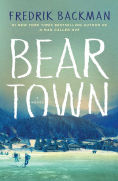
I am not a hockey fan. I can’t even skate. And this book is about hockey … only it’s not, really. So if you don’t care about hockey, do not let that be the reason you pass on this novel.
I am clearly a fan of Backman’s novels. I’ve read everything now except his recent novella. But this book surprised me. When I got it, I was expecting a certain type of book—a Bad News Bears for Swedish hockey. And the first part of the book seems to follow that pattern. To be honest, I would have been content with that. It would have been enough for me to enjoy the novel.
The story begins in a small rural village where hockey is everything, and the junior team (teens) is in the national semi-finals. Only once before in the club’s history has it ever done this well (back when the current General Manager was a player), and because of economic reasons, a lot more rests on this season for the village than just club pride. The town is dying, and getting a hockey academy to open there would afford the village a chance at an economic revival.
But then suddenly—and I won’t offer any spoilers—the novel changes character entirely and opens the story up to far more compelling and important issues.
It’s about family, loyalty, everything that is wrong about sports culture (and a whole lot that is right about it, as well), justice, friendship, and community. In other words, it starts out a small Cinderella sports story and explodes into a major personal and communal drama.
Backman still defies description for me, in some ways. Is it high literature? I don’t know. His novels are sentimental at times, but certainly not more so than Charles Dickens. But the emotional chords Backman plays really affect me in unexpected ways. In some ways, I find that more compelling than “artistry.” I will continue to read all of his books. I only hope he proves as prolific as Dickens.
I am clearly a fan of Backman’s novels. I’ve read everything now except his recent novella. But this book surprised me. When I got it, I was expecting a certain type of book—a Bad News Bears for Swedish hockey. And the first part of the book seems to follow that pattern. To be honest, I would have been content with that. It would have been enough for me to enjoy the novel.
The story begins in a small rural village where hockey is everything, and the junior team (teens) is in the national semi-finals. Only once before in the club’s history has it ever done this well (back when the current General Manager was a player), and because of economic reasons, a lot more rests on this season for the village than just club pride. The town is dying, and getting a hockey academy to open there would afford the village a chance at an economic revival.
But then suddenly—and I won’t offer any spoilers—the novel changes character entirely and opens the story up to far more compelling and important issues.
It’s about family, loyalty, everything that is wrong about sports culture (and a whole lot that is right about it, as well), justice, friendship, and community. In other words, it starts out a small Cinderella sports story and explodes into a major personal and communal drama.
Backman still defies description for me, in some ways. Is it high literature? I don’t know. His novels are sentimental at times, but certainly not more so than Charles Dickens. But the emotional chords Backman plays really affect me in unexpected ways. In some ways, I find that more compelling than “artistry.” I will continue to read all of his books. I only hope he proves as prolific as Dickens.
 RSS Feed
RSS Feed
